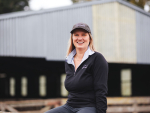South Canterbury dairy farmer and recently-retired Fonterra director Leonie Guiney has welcomed an announcement from the Canterbury Regional Council (ECan) that development of its Regional Policy Statement has been paused.
ECan says it has put a halt on it until January 2026 "in light of recent changes in government direction on freshwater management". New legislation states that councils must not notify freshwater planning instruments for public consultation before 31 December 2025 or until a new National Policy Statement for Freshwater Management is gazetted, whichever is the earlier.
Guiney welcomes the halt but says farmers need more.
“It’s progress, but right now their land use consent to farm settings force me to reduce my productivity irrespective of water quality outcomes.”
Guiney was among about 400 people who attended the recent Federated Farmers-organised “Restoring Farmer Confidence” public meeting in Ashburton, with speeches by Prime Minister Christopher Luxon, Associate Agriculture Minister Nicola Grigg, and Feds President Wayne Langford.
It was the second such meeting of a nationwide tour, the first being at Mystery Creek, Waikato, and the third at Waimumu, Southland.
The major theme of the Government speakers was that they were working to reform the RMA and reduce other red tape to increase the productivity and efficiency of farming and the economy in general.
But speaking from the audience during the Q&A session, Guiney said the Government was “not entirely in control” of those productivity settings because the Regional Council was so influential.
“We do care about the environment, and what we would love is to be able to use the data that we collect on water quality to determine our settings when we are applying for consents to farm.”
The only levers farmers can use under ECan models to show they are reducing nitrogen leaching were reducing cow numbers and fertiliser input, she said.
“As farmers for years and years we know how to optimise what our stocking rates should be. And it’s a core comparative advantage that we stay in control of that.
“At the moment ECan is controlling it. I must prove, to get my next consent to farm, that I will reduce my productivity in 2028.
“They won’t let me use my data showing that our nitrate levels in our rivers in Fairlie are well below the targets.”
Luxon said he had spoken with the ECan deputy chair that morning to make the point that the new government was here to grow the country.
“We’ve got to bust up the RMA. We’ve moved quickly in 12 months. This thing’s quite a beast and a whole cottage industry has built up around the RMA.”
Over 20 years the country had started building a horse but ended up with a camel, said Luxon.
“It affects everything that we’re doing in this country.”
To enthusiastic applause, Luxon said it had turned what used to be a can-do kind of place into an “obstruction economy and bureaucracy”.
Asked later if she was happy with Luxon’s response, Guiney said ECan was still in control of her consents to farm.
“If I sign up to what they want now, it’s reduced stocking rates, it’s reduced fertiliser inputs. Even though my fortnightly data shows there’s no issue over nitrates in the water around us.
“So, there’s no linkage between actual environmental outcomes and the settings that ECan is demanding of us and our land use consents.”
“Of all our elected representatives, we seem to have people in there [ECan] with just an agenda to reduce cow numbers.
“They’re not interested in any of our data on water quality outcomes, they’re just interested in reducing cow numbers.
“They’ve got this mindset that fewer cows will mean better water quality outcomes, but we want to measure water quality outcomes and make our own decisions.”


















